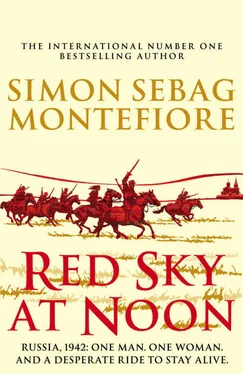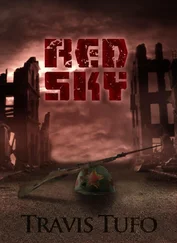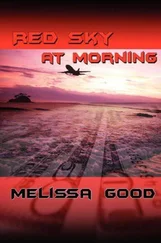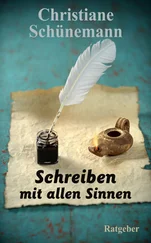The shot spanged into the grass right beside him, sending up a pirt of dust. Benya looked back. A dark swarm of horsemen was gathering in the corrugated, wavy heat of the late morning. He recognized the hunched figure of Malamore at the front, his sabre drawn. Fabiana turned Violante and stared at them, breathless, cursing ‘ Stronzo! ’ – until Benya, who cocked his Papasha, seized her bridle: ‘Come on!’
Volleys of bullets ripped into the ground around them, and Silver Socks reared to one side but Benya managed to steady her. Ahead Fabiana was riding Violante up the hill towards the trees. ‘ Pronti a fare fuoco! Prepare to fire!’ Benya could hear Malamore (he guessed it was he) yelling at his men to wait a moment, not to shoot until his order, what if they hit the girl – but on they came anyway, twenty, thirty horsemen, hooves clopping on the dry grassland. As he reached the cool of the trees, Benya saw more horses and men ahead of them, another Italian squadron coming around the back of the woods… Now they had no hope.
Screwing his eyes closed in a moment of freefalling panic, Benya gripped Silver Socks with his knees, but he couldn’t decide what to do – to dismount, to fire, just to give up and die. He was shuddering, already wincing at the agony to come.
He checked the grenades at his belt. If he had to, he would finish this himself.
Two circles of a pair of binoculars range over the Donside hills. The observer stops and focuses the lenses.
He watches two riders galloping across the open steppe, a man and woman. The man is in khaki fatigues with an Italian forage cap, a Papasha on his arm and grenades on his belt. He is riding a Budyonny with white feet. She is in Italian green with Red Cross markings on an armband, her dark hair not tied up, flowing behind her, and she is spurring on her palomino. There is something desperate about them. The man – who’s older and not a great rider – keeps looking back, jerkily. There’s a sense of fear in the way the woman is lurching in her saddle, shaking and unsure. They are both losing speed.
The observer, who is lying in the grass close to the local collective farm office a little further, and higher, up the same ridge, scans back over the high grass. Behind the fugitives ride two Kalmyks on their scratchy ponies; and then a posse of riders, twenty, thirty, forty horsemen in some disorder: an Italian Blackshirt colonel on a black stallion, Germans with SS runes on their tunics, Russian traitors in Wehrmacht field grey. Amidst them a man carries a female child on his saddle: a refugee rescued? A rare kindness in these flint-hearted times? Amongst these barbarians? Well, that would be a surprise.
He sees the shots spanging into the grass around the two riders. The pursuers are closing in and now he spots a second squadron of Italians appearing around the copse at the top of the hill, firing down at them. This odd couple have his full attention. They are being attacked by the enemy, and his Stavka orders from Comrade Ponomarenko, Chief of Partisan Operations in Moscow, are clear: ‘Harass and destroy all enemy forces, communications and weapons in rear of the Sixth Army.’
He turns to the men beside him. He always speaks softly in a tone that commands obedience. ‘Fire all four Dashkas now. And mortars. Quickly or we’ll be too late!’
‘Done, Comrade Elmor!’ says Smiley as the heavy Degtiarev–Shpagin machine guns, known as Dashkas, open up with their metallic chug-chug to pump lead into the squadron of Italian horsemen.
Fabiana saw the church tower and onion dome of a little Cossack village of colourfully painted cottages, yards and stables. A signpost read: Shebinkino. A foaming riderless horse caught up with them, dragging its German rider, his shirt forming a bundle over his head. She could still hear the machine guns and the whistle of mortars close behind them. Such was their panic that she and Benya had galloped headlong into the main lane of the village without checking what was ahead.
It was noon but the village seemed deserted. A dead dog lay in the road; cats shrieked somewhere. It was sweltering, and Fabiana could smell rotting hops, sweet vines, wormword and dank water. She looked up and now she could see the shells exploding over the Don Bend where the battle raged just a few miles away. She was still out of breath and when she glanced at Benya, he was white, almost slipping off his horse, his hands shivering uncontrollably.
The horses suddenly balked and tried to turn. A mangy wolf stood in the middle of the street. Fabiana looked into its hungry and astonishingly white eyes. Once the wolf had been a symbol of wild ferocity; now it was just another hunted creature in a world where man had outdone the wolf in savagery. ‘ Ciao, bello ,’ she said to it, remembering how Natasha had seen the wolf in War and Peace . It trotted away – and the horses, sweating yellow foam, staggered to a halt.
Fabiana scissored off Violante in time to catch Benya as he slipped off Socks into her arms, relieving him of the sub-machine gun – she hung it on her shoulder – and leading the horses away. She heard the rattle of traces and the clip of hooves. Benya was lying on the ground in the space between two cottages while she looked around.
A waxy old woman dressed in bright red was approaching them. Halting her tarantass and getting down off its box, she hobbled into a nearby cottage without tying up the horse.
Glancing at Benya, who nodded at her, Fabiana tied up their horses and followed the woman through the open front door. How fast we brigands learn, she thought, unhooking her gun, we bandits in love.
In the main room, the crone was putting dried cherries into a bowl and Fabiana also spotted some salo and buckwheat gruel.
‘You steal from Afonka and you’ll die in agony,’ said the crone without looking up. Fabiana peered at the shelves around the room, packed with jars of seeds and bottles of cloudy liquids. ‘A Jew and a foreigner come into the home of a woman abandoned by all and steal from her at gunpoint. You’ll bring the curse of the water spirit of the Don on yourselves. Who’s this now?’
Fabiana looked round and Benya was behind her, shakily levelling his pistol. Fabiana wanted to get out quickly but Benya did not look good and the woman had the food.
‘The Jew thinks of killing me. But the Immaculate Virgin will decide when I go. You’ll be struck down by lightning or steel or poison.’ She sucked her bare gums.
‘Tell us then, Matushka , what should we do?’ asked Benya, lowering his Parabellum.
‘Let me cleanse you unbelievers with holy Don water, and I shall give you something.’
‘We have no Don water.’
‘I have it in the bucket. Bring it.’
Benya brought the bucket and the crone glared right at him. Fabiana could see that her eyes were a veined blue-whiteness with no irises.
‘I see well for a blind one?’ the crone said, making the Cross with a yellowed nail on his forehead. ‘The enemy of Christ is forgiven by the Immaculate Virgin, who drives out the beast in the heart. Amen!’ Then she repeated it on Fabiana. ‘I see a field of sunflowers, faces raised to the sun and in the middle of them a couple are kissing, oblivious to the world. I see a kind doctor and a happy little girl, a Jew child who walks away into the distance. Eat your food – here – and water.’
‘Thank you, Matushka ,’ said Benya, gulping down some bread and gruel with his fingers. Fabiana poured water for both of them.
‘Leave me something. I don’t need much,’ the woman said as Fabiana gathered the food, longing to get away.
‘Go out the back,’ the crone continued. ‘That way’ – she pushed them through the back door – ‘and you’ll learn how I never threaten lightly. Go!’
Читать дальше












